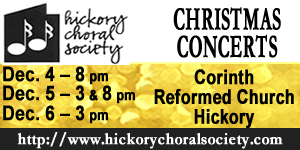‘Tis the season – and all that – and the show must go on, so on this slushy December evening a goodly crowd found its way to Hill Hall on UNC-CH campus to be warmed and cheered by music of the season presented by the Chapel Hill Community Chorus under the direction of Sue Klausmeyer. The chorus is beginning its 29th season and Klausmeyer her 10th season as conductor.
The concert, entitled “Deck the Halls: The Old World and the New” consisted of two widely disparate genres of music. The first half of the concert featured an old story – St. Nicolas – set to new (20th century) music by Benjamin Britten; the second half featured music in the contemporary spiritual/gospel style. Klausmeyer, the chorus and orchestra seemed at home and competent in both genres.
St. Nicolas was composed in 1948 for the amateur forces of Lancing College, the public school from which Britten’s companion, Peter Pears, had graduated. The text was prepared by Eric Crozier and relates a retrospective of the 4th century Bishop of Myra, known for his generosity, his love for children, and his concern for sailors and ships (thus, patron saint of children, seamen, and travelers). Britten’s challenge was to set a dramatic scenario to music that was performable by non-professionals without sacrificing musical substance. His ingenious resolution of this challenge is demonstrated in the Introduction where the choir is grounded on a thrumming pedal point while the solo tenor (the only professional singer needed) sings Nicolas’ narrative which migrates through an enigmatic variety of tonalities, echoing an earlier violin solo.
Klausmeyer’s program notes describe St Nicolas as “a dramatic cantata in nine movements” and indeed it is. Scored for mixed chorus, treble ensemble, tenor solo and four children’s voices along with a string orchestra, piano duet, organ and percussion, Britten makes full use of all in dramatizing the tale in an almost operatic manner. He is especially effective in describing the threatening storm and rescue at sea (IV). The jaunty “Birth of Nicolas” (II) in an omp-pah-pah waltz rhythm provides an effective aural experience of the poet’s text, “Water rippled Welcome!” The grisly “Pickled Boys” movement (VII) is a miniature opera set to an ominous march depicting travelers looking for a meal which ends with Nicolas restoring the three boys to life. Another movement of note is the contemplative solo “Nicolas Devotes Himself to God” (III).
To involve the audience in the performance, Britten includes two chorale hymns both of which were sung with gusto and served their purpose well. The chorus, including the treble ensemble, was on the mark in this performance, singing convincingly throughout. James Daubert sang the young Nicolas with clear and sparkling tones. The three “Pickled Boys” singing Alleluia as they processed in response to Nicolas’ bidding brought chills to all. They were sung by Austin Elizabeth Regnerus, Ariana Sheeks and Julia Demorest.
Wade Henderson was awesome as Nicolas. His fully mature voice is at the peak of its clarity and power. He seems to sing difficult roles effortlessly and just gets better every time we have the opportunity to hear him. There is also the revealing insight he adds to a performance by his subtle theatric response to what is going on even when he is not singing.
After intermission, we heard two spirituals in arrangements by André Thomas of Florida State University. Lacy Scofield did the solo work in a mellow soprano lead in “Rise Up, Shepherd, and Follow.” “Go Where I Send Thee” was sung strongly by Daniel Worrall with the chorus providing a lively partnership.
The final selection on the program was Robert Ray’s Gospel Magnificat. Ray, on the faculty of the University of Missouri at St. Louis, is composer of the Gospel Mass, which many followers of the CHCC will remember from their summer chorus concert a couple of years ago. The Gospel Magnificat, his latest melding of Latin liturgical text in the gospel idiom, featured jazz soprano Christen Campbell belting out with amplification (probably unnecessary) this poetic gem from the first chapter of the Gospel of Luke. There were some moments of reverent tenderness, especially in the chorale-like treatment of the passage “He has shown mercy on them that fear Him.” Most of the rest of the text featured swaying bodies and hands clapping a lively rhythm.
It was a fine concert to take one’s mind off of mundane concerns like the weather and what else needs to be done before the 25th. The slick program with Klausmeyer’s informative notes and especially the complete printed texts was also very much appreciated.












